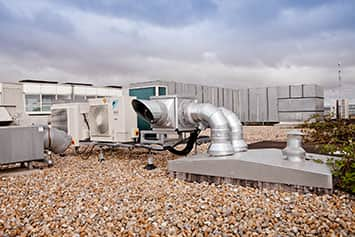With the UK’s unpredictable weather bringing both heat waves and chilly spells, commercial air conditioning units are becoming a must-have for businesses looking to keep staff and customers comfortable all year round.
But before installation begins, one key question often arises: Do you need planning permission for commercial air conditioning units?
Whether fitting a system on a flat roof, upgrading an older unit, or operating in a conservation area, knowing the rules can save you from costly delays and compliance issues.
This guide will explain when planning permission is needed, what exemptions exist, and how to get approval smoothly so your business stays cool, efficient, and fully compliant.
Need expert support with your commercial aircon servicing and installation? JP Air Conditioning provides professional advice, installation, and planning assistance across London and the South East.
Call us on 02083331191 or email us at info@jpaircon.com today!
Connect with JP Air Conditioning experts for cooling solutions that meet planning regulations and deliver reliable comfort for your business.
When Does Planning Permission For Commercial Air Conditioning Apply?
Let’s look at the core factors that determine whether you’ll need to apply for planning permission:
1. Location Of The Unit
- Wall-mounted units on side or rear elevations might not need permission if they meet specific size and height limits.
- Units placed on a flat or elevated roof are more likely to require planning permission due to visibility and potential impact on nearby properties.
2. Proximity To Residential Areas
You must consider noise pollution levels in your commercial. Planning authorities may reject applications or require soundproofing solutions if the unit is too noisy.
3. Conservation Areas Or Areas Of Outstanding Natural Beauty
Suppose your property is located in a conservation area, an area of outstanding natural beauty, or is part of a listed building. In that case, you will almost certainly require planning permission before any installation. This is to protect the architectural or environmental significance of the site.
4. Size And Type Of System
Small, low-impact systems such as an air source heat pump may fall under permitted development rights – provided they meet criteria laid out in the General Permitted Development Order (GPDO). However, commercial premises are subject to tighter rules than residential properties, particularly regarding size, visibility, and noise.
5. Impact On The Surroundings
- Heat output, positioning of exhaust vents, and unit vibration can all factor into whether permission is needed.
- Some councils may also request an Energy Performance Certificate (EPC) or other documentation to confirm the system’s efficiency.
6. Ventilation And Gas Regulations
If your system includes integrated ventilation or if you’re replacing a gas or boiler-based system, you may be subject to additional regulations around refrigerants and heat output.
Contact JP Air Conditioning
The Smart Way To Install Commercial Air Conditioning
The good news? Proper planning and support allow you to navigate the process smoothly and avoid unwanted surprises.
1. Know Your Rights Under Permitted Development
Some commercial air conditioning systems are allowed under permitted development – meaning no planning permission is required. However, these rights are subject to strict rules, including:
- The unit must not exceed a certain decibel level at the property’s boundary.
- The external appearance must not harm the local area.
- The unit should not protrude excessively from the building façade.
2. Work With A Professional Installer
Reputable installers understand local planning laws and can often advise on the following:
- Whether planning permission is needed.
- How to reduce noise pollution.
- Options for discreet positioning or soundproofing.
3. Check Local Regulations
Each council interprets planning regulations slightly differently. For example:
- In a conservation area, any visible addition to the exterior may require planning.
- You’ll need listed building consent and planning permission for a listed building. Always check with your local authorities before proceeding.
4. Mitigate Environmental Impact
Choosing an energy-efficient air conditioning system – such as a low-noise heat pump – reduces energy bills and makes planning approval more likely. Your local council may even encourage eco-conscious systems, especially if replacing older, inefficient units.
Stay Cool And Compliant – What To Do Next
Ready to move forward with your air conditioning installation? Here’s how to do it the right way:
Step 1: Conduct A Site Assessment
Before purchasing a unit, assess:
- Where will the unit be installed?
- Whether it will be visible from the street.
- Its distance from neighbouring properties.
Step 2: Speak To A Planning Consultant Or HVAC Professional
Get expert advice if you’re unsure whether you need planning permission for commercial air conditioning units. This step can save time, money, and hassle later.
Step 3: Contact Your Local Planning Authority
Ask about:
- The latest planning regulations in your area.
- Whether your unit meets Permitted Development criteria.
- Requirements for working in protected zones like a conservation area or with a listed building.
Step 4: Submit A Planning Application If Needed
If required, your installer or consultant can help prepare documentation and evidence for approval, including noise assessments, structural plans, and environmental impact evaluations.
Step 5: Plan For Ongoing Maintenance And Compliance
Once installed, regular servicing helps keep your system efficient and within noise pollution and heat output limits.
Contact JP Air Conditioning For Commercial Cooling Solutions That Comply With Planning Regulations
JP Air Conditioning is a trusted aircon contractor, providing expert commercial air conditioning solutions tailored to your building’s layout, usage, and regulatory requirements. With decades of industry experience and full certification, we help businesses stay calm and compliant. Our services include:
- Professional installation: From rooftop units to discreet indoor systems, we optimise placement, performance, and energy efficiency.
- Ongoing maintenance and fast repairs: Our prompt, professional, 24/7 callouts and repair support ensure your system stays reliable.
- Fully certified engineers: We install leading brands like Daikin, Mitsubishi, and Fujitsu—backed by warranties of up to 7 years.
Whether you’re looking for domestic and commercial aircon installations, replacing an old one, or seeking advice about planning permission, JP Air Conditioning is here to help.
Call us today on 02083331191 or email info@jpaircon.com for expert advice and a free quote.
Frequently asked questions
Do I need planning permission for a commercial air conditioning unit?
Yes, especially if it’s visible, noisy, on a flat roof, or in a conservation area or listed building.
What are the rules for installing commercial air conditioning units?
Units must meet noise, visibility, size, and location requirements under local planning regulations or permitted development rights.
Are there exemptions for small commercial air conditioning units?
Small units may qualify for permitted development if they meet noise, size, and placement criteria in non-sensitive locations.
How do I apply for planning permission for an air-con unit?
You must apply site plans, noise assessments, and specifications to your local planning authority for review and approval.
What are the fees for a planning permission application?
Commercial planning application fees in the UK typically range from £120 to £500, depending on project scale and location.
Can I install an air conditioning unit on a listed building?
Only with Listed Building Consent and planning permission due to historic preservation regulations and architectural impact considerations.
Do I need permission to replace an existing air-con unit?
You need permission if the new unit differs in size, position, or noise output, especially in sensitive areas like conservation zones.
Can my local council refuse planning permission for an air-con unit?
Yes, if the unit causes noise pollution, affects building appearance, or violates conservation or residential protection rules.
How long does it take to get planning permission for an air-con unit?
It takes 8 weeks, though it may take longer for listed buildings, appeals, or complex commercial sites needing additional reviews.



